| Listing 1 - 10 of 50 | << page >> |
Sort by
|
Book
ISBN: 9789004274051 9789004274068 9004274065 9004274057 1306771986 9781306771986 Year: 2014 Publisher: Leiden Brill
Abstract | Keywords | Export | Availability | Bookmark
 Loading...
Loading...Choose an application
- Reference Manager
- EndNote
- RefWorks (Direct export to RefWorks)
"Only a few decades after the Holocaust, Belgian Jews, like most European Jewries, are under the attack of forces stemming from a variety of sources. How do they confront and stand these new hardships? Research done all over Europe from 2012 through 2013 tried to answer this question. Among the cases investigated, the Belgian Jewry is one of the most interesting. It is both versatile and representative, revealing essential components of the general experience of European Jews today. Conceptual considerations pave the way to the study of their plight that has been, by any criterion, anything but "usual". Belgian Jews, it appears, are "like" many other Jewries in Europe but "a little more". They highlight the question: is allosemitism at all surmountable?"--
Antisemitism --- Jews --- Antisémitisme --- Juifs --- History --- Histoire --- Antisémitisme --- Hebrews --- Israelites --- Jewish people --- Jewry --- Judaic people --- Judaists --- Ethnology --- Religious adherents --- Semites --- Judaism --- Anti-Jewish attitudes --- Anti-Semitism --- Ethnic relations --- Prejudices --- Philosemitism
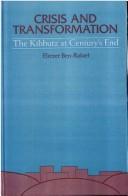
ISBN: 0585065217 9780585065212 9780791432259 0791432254 9780791432266 0791432262 0791432254 0791432262 079149635X Year: 1997 Publisher: Albany, N.Y. State University of New York Press
Abstract | Keywords | Export | Availability | Bookmark
 Loading...
Loading...Choose an application
- Reference Manager
- EndNote
- RefWorks (Direct export to RefWorks)
This book examines kibbutz life following the Israeli economic crisis of 1985, focusing on the kibbutz's dramatic transformation from a well-defined social structure to a collective identified principally by its cultural preoccupations. It centers on the contradictions endemic to kibbutz identity. Ben-Rafael shows how the crisis brought together a general pro-change Zeitgeist with the interests of the kibbutz's stronger social segments and individuals to produce widespread changes and the fragmentation of kibbutz reality as a whole. The book's findings are based on a large-scale research investigation (1991-1994) headed up by Ben-Rafael that included twenty research studies and involved the participation of researchers from diverse social-science disciplines. The book also provides a statistical abstract and a comprehensive kibbutz bibliography.
Kibbutzim. --- Political Science --- Law, Politics & Government --- Socialism, Communism & Anarchism --- Kibbutz settlements --- Kibbutzes --- Ḳibutsim --- Collective settlements --- Economic order --- Israel

ISBN: 1280466693 9786610466696 1417510420 904740145X 9781417510429 9789047401452 9789004125353 9004125353 9781280466694 6610466696 Year: 2002 Publisher: Leiden ; Boston : Brill,
Abstract | Keywords | Export | Availability | Bookmark
 Loading...
Loading...Choose an application
- Reference Manager
- EndNote
- RefWorks (Direct export to RefWorks)
Ten years after the creation of the state of Israel, David Ben Gurion wrote to 50 of the best thinkers and researchers in the world asking ""Who is a Jew?"" This publication contains the letters that answered this question, the original text of Ben Gurion, and an analysis by Shalow Tasavi.
Jews --- Identity, Jewish --- Jewish identity --- Jewishness --- Jewish law --- Jewish nationalism --- Identity. --- Ethnic identity --- Race identity --- Legal status, laws, etc. --- Ben-Gurion, David, --- Green, David, --- Yariv, S. S., --- Bin Jūriyūn, --- Ben-Guryon, Daṿid, --- Grin, Daṿid, --- Gurion, David Ben-, --- Guryon, Daṿid Ben-, --- Gruen, David Joseph, --- Gryn, David, --- Ben Gourion, --- Ben Gourion, David, --- Grün, David, --- בו־גוריון, דוד --- בן גוריון --- בן גוריון, דוד, --- בן־גוריון, דוד, 1886־1973 --- בן־גוריון, דוד, --- בן־גוריון, דויד, --- בן־גוריון, ד. --- בן־גוריון, ד., 1886־1973 --- בן־גוריון, --- בן־גורין, דוד, --- בן־גריון, דוד --- בן־גריון, ד. י., --- בן-גוריון, דוד --- בן-גוריון, דוד, --- בן-גוריון, ד., --- בן-גוריון, --- יריב, ס. ש. --- יריב, ס. ש., --- بن-غوريون، دافيد --- بن-غوريون، دافيد
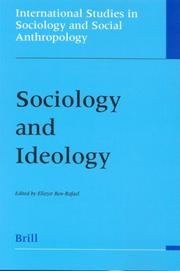
ISBN: 1280467517 9786610467518 1423712056 904740226X 9781423712053 9789047402268 9004131043 9789004131040 9781280467516 661046751X Year: 2003 Publisher: Leiden Boston Brill
Abstract | Keywords | Export | Availability | Bookmark
 Loading...
Loading...Choose an application
- Reference Manager
- EndNote
- RefWorks (Direct export to RefWorks)
When examining how the social sciences have dealt with ideology, one's first impression is often one of considerable confusion. Sociology in particular is the scene of heated debates about ideology. These debates go sometimes so far as to echo doubts of participants with regard to their opponents' scientific endeavor, even straightforward denials of their scientific status. This volume brings together a series of articles that throw light on selected aspects of this intricate matter by well-known sociologists Boudon, Wittrock, Arnason, Touraine, Smolicz, Secombe, Wieviorka, Ben-Rafael and Sternberg.
Sociology --- Philosophy. --- Philosophy
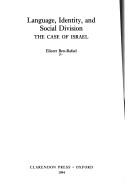
ISBN: 0198240724 9780198240723 Year: 1994 Publisher: Oxford Clarendon Press
Abstract | Keywords | Export | Availability | Bookmark
 Loading...
Loading...Choose an application
- Reference Manager
- EndNote
- RefWorks (Direct export to RefWorks)
The shift to Hebrew as a national language is at the root of the creation of Israel, yet many Jewish former immigrants still use the language of their country of origin. Ultra-orthodox communities retain their own codes, and the use of Arabic remains a clear marker of the Israeli-Arab town and village. At the same time Israel's position in international affairs has encouraged a wide penetration of the society, along class lines, by languages of world-wide communication. These very same languages, for example English and French, have different values in their local context, and play active, and different, roles in the formation of social boundaries. In his analysis Eliezer Ben-Rafael focuses on linguistic resources and symbols which reflect and reveal the complex structure of class, ethnic, religious, and national identities and cleavages in Israeli society. More generally, he uses the Israeli case to show how sociolinguistic ideas may be related to sociological propositions about social aspects of language use.
Sociolinguistics --- Israel --- Languages. --- Ethnic relations. --- Language and languages --- Language and society --- Society and language --- Sociology of language --- Language and culture --- Linguistics --- Sociology --- Integrational linguistics (Oxford school) --- Social aspects --- Sociological aspects
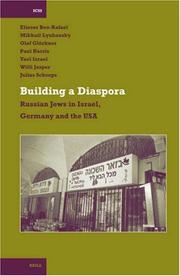
ISBN: 9004153322 9789004153325 9789047418535 9047418530 Year: 2006 Publisher: Leiden ; Boston : Brill,
Abstract | Keywords | Export | Availability | Bookmark
 Loading...
Loading...Choose an application
- Reference Manager
- EndNote
- RefWorks (Direct export to RefWorks)
The crumbling of the USSR has set Russian-speaking Jews free to emigrate. From the threat of antisemitism to economic disaster, their "good reasons" to do so were numerous and within one and a half decade most of them moved out and scattered throughout the world. This book is about the million that settled in Israel, the half million now in the US and the 200.000 who settled in Germany. This book presents the comparative work of an international team of researchers which delves into the building of communities, the formulation of collective identities and the articulation of public discourse by people who, after eighty years of Marxism-Leninism and compulsory removal from Jewish culture, are now reconstructing their ethnicity. In every place, they face contrasting challenges and as a whole, constitute an ideal case for the study of the making of contemporary transnational diasporas.
Jewish diaspora. --- Jews --- Jews, Russian --- Diaspora juive --- Juifs --- Juifs russes --- Identity. --- Social conditions --- Identité --- Conditions sociales --- Jewish diaspora --- Social aspects --- Identity --- Diaspora, Jewish --- Galuth --- Human geography --- Russian Jews --- Identity, Jewish --- Jewish identity --- Jewishness --- Jewish law --- Jewish nationalism --- Diaspora --- Migrations --- Ethnic identity --- Race identity --- Legal status, laws, etc.
Book
ISBN: 0566055066 Year: 1988 Publisher: Aldershot Avebury
Abstract | Keywords | Export | Availability | Bookmark
 Loading...
Loading...Choose an application
- Reference Manager
- EndNote
- RefWorks (Direct export to RefWorks)
Book
ISBN: 2738171338 Year: 2014 Publisher: Paris, France : Odile. Jacob,
Abstract | Keywords | Export | Availability | Bookmark
 Loading...
Loading...Choose an application
- Reference Manager
- EndNote
- RefWorks (Direct export to RefWorks)
Children of Holocaust survivors --- Psychic trauma in children. --- Psychology.
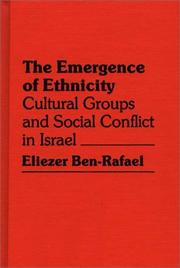
ISBN: 0313230889 Year: 1982 Volume: 7 Publisher: Westport, Conn. : Greenwood Press,
Abstract | Keywords | Export | Availability | Bookmark
 Loading...
Loading...Choose an application
- Reference Manager
- EndNote
- RefWorks (Direct export to RefWorks)
Ethnicity --- Social conflict --- Ethnicité --- Conflits sociaux --- Israel --- Israël --- Ethnic relations. --- Relations interethniques

ISBN: 0313255539 Year: 1987 Publisher: New York (N.Y.): Greenwood
Abstract | Keywords | Export | Availability | Bookmark
 Loading...
Loading...Choose an application
- Reference Manager
- EndNote
- RefWorks (Direct export to RefWorks)
Fedayeen --- Guerrillas --- Jewish-Arab relations --- Munaẓẓamat al-Taḥrīr al-Filasṭīnīyah.
| Listing 1 - 10 of 50 | << page >> |
Sort by
|

 Search
Search Feedback
Feedback About UniCat
About UniCat  Help
Help News
News